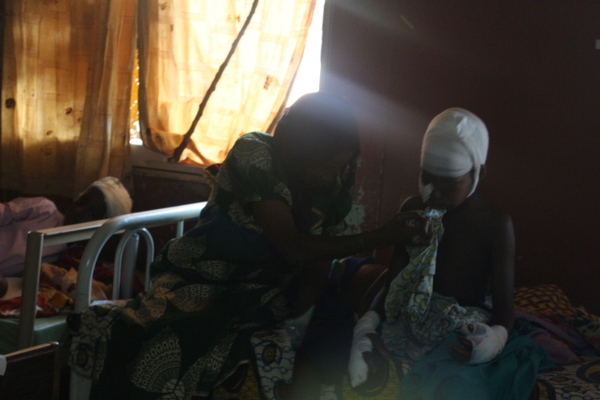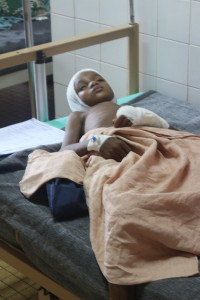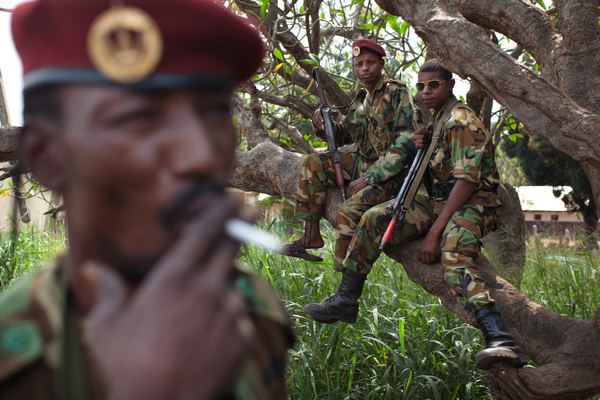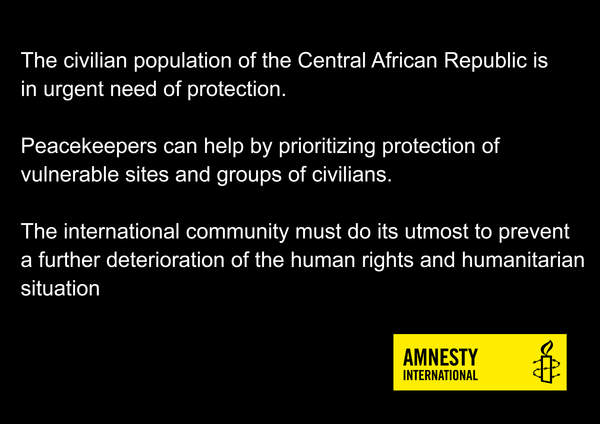
By Susanna Flood, Director of Media at Amnesty International
Her voice began to choke and then the tears began to flow down her face as she calmly and steadily recounted the long list of names of all the women and children killed in her village when the anti-balaka struck a week ago.
Sitting in a darkened hospital ward at the Hôpital Communautaire, she gracefully removed her headscarf and revealed the stitches laced across her scalp where the machete had struck. Alongside her was her four-year-old daughter with a matching wound on her head, also the victim of machete attacks.

Nearly everyone in her village near Bangui, the Central African Republic’s capital city, had been wiped out in these early strikes by the anti-balaka militia who unleashed the carnage that has since been wrought on Bangui.
We met her one week after she had suffered those attacks and she told us what happened in her village with amazing calm and dignity. In her ward were numerous women also recovering from the various machete and bullet wounds inflicted by unknown attackers in the violence that has run riot across Bangui and the nearby villages.
At a nearby mosque, in a small, crowded side street in an area mostly populated by Muslims – known as PK5 – we watched as 16 bodies were removed from a truck and taken for burial. Wrapped in white plastic sheeting, the bodies had attracted a huge crowd, angry about how these people had died and eager to tell us what had happened.
Most of the dead were reportedly civilians and we heard gruesome stories about how they had reportedly been the victims of brutal revenge attacks.
People told me that some had been decapitated by their attackers; some with their ears cut off; others slashed down the center of their bodies and disemboweled. We didn’t see the bodies, but we are obtaining photos to confirm these reports.
Across the road from the mosque we were introduced to a group of around 50 women and children from the Boeing quartier – all of whom had lost their husbands and fathers in different attacks. Like the woman in the hospital, their faces were dispassionate, with just one woman in the crowd visibly crying.
It is not hard to find tales of misery in Bangui today. You need only travel to the airport where the sprawling camp for displaced people is growing by the day.

People have arrived in their thousands, believing the airport to be a safe haven because of the proximity of French troops. Men, women and children have all taken up residence, with groundsheets of various colors and textures spread everywhere, providing scant protection from the hard, dusty ground below. A few tents have been erected but most are without any kind of shelter from the sun or the rain. Some have found protection from the elements among those crowded into a hangar for old aircraft or beneath the wings of old planes parked nearby.
It’s as if the camp has been there for weeks of months, not the few days in which it has sprung up, attracting an estimated more than 15,000 people from around Bangui, increasing to more than 40,000 at night.
One woman who stopped to talk to me expressed the plight of those gathered in the camp very simply: “We are afraid,” she told me. It is as simple as that.
That fear is everywhere in Bangui: in every community. The attacks have been so sudden, with so many killed and injured, that everyone is afraid. Afraid of their neighbors, all trust between Muslims and Christians destroyed, and with no trust in the government’s ability to help them.

